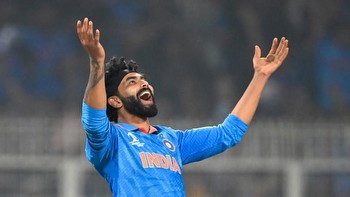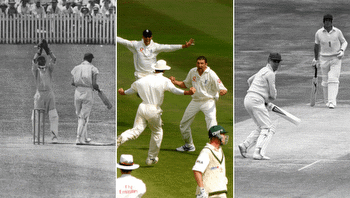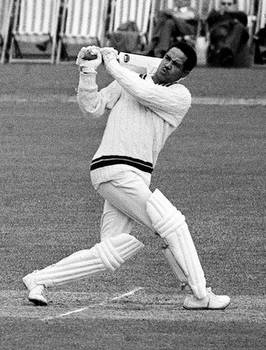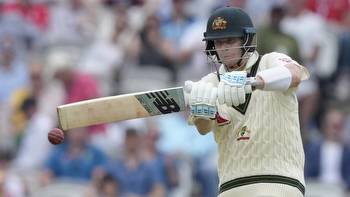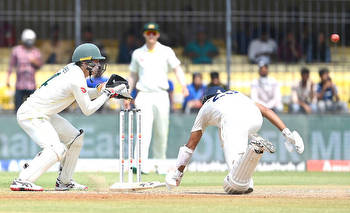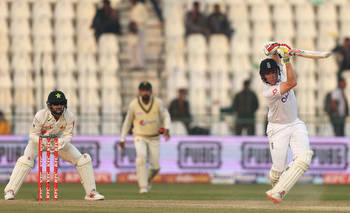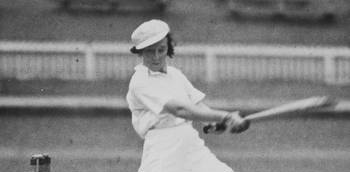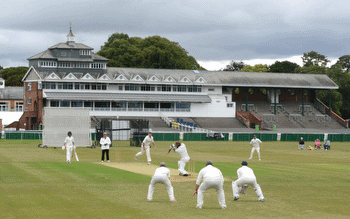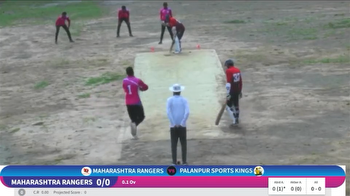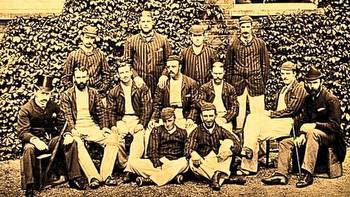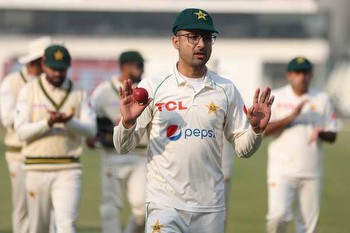Confessions of a village cricket club chairman...
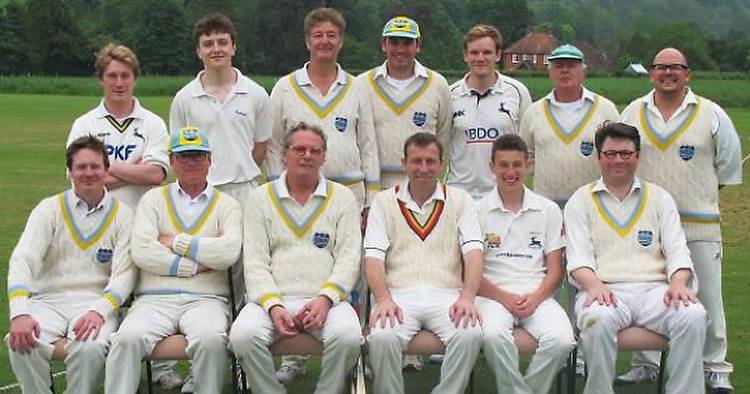
NICKY BIRD, whose V&A Cricket Club plays at Stonor Park, looks at cricket at “the bottom end of the market”, as the new season begins.
THERE’S a touch of eccentricity in the humble club cricketer and an element of “because it’s there”.
There’s a pitch that someone has rolled, an opposition who’ve motored from Wargrave, someone has bought a ball and there’s lunch and tea to be had. Kipling referred to “the flannelled fools at the wicket”, as though we are Woosterish buffoons. Some are but others are escaping the kids or simply want to bowl a ball very fast at someone 22 yards away.
The V&A Cricket Club was formed in 1974 or so (the archivist has lost the records) when I was at the V&A Museum.
We were originally a bunch of art historians (and losers) and wholly useless. But then we became marginally useful as otherwise you can’t last until teatime and there’s a dreary wait for the pub to open. The key is conviviality.
Although it helps if a player can walk unaided to the crease, if he isn’t good company you don’t want to spend a day with him. We tolerate most weirdos, even curmudgeons if they’re amusing, but not the cocky or rude.
The cardinal crime at village level is not to “walk”. This doesn’t refer to disability but to a batsman pretending they didn’t snick a ball that’s been caught by the keeper. Terribly poor form.
Even worse is a batter who refuses to go after being given out by the umpire. We’ve had obscene rants from chaps who continue their violent protest in the changing room.
As club chairman, I was detailed to tell one such oaf to b****r off for good (well, sort of). He asked why. My nerve failed as I couldn’t face telling him he was ghastly, so I said: “You’re too old.”
He replied: “You’re older.”
There the conversation petered out.
Age isn’t a problem or I’d only be there for the washing up. My daughter, when 12, batted with her grandfather who was 82. She hit the winning run.
Oppositions hate a little munchkin coming in to bat with six to win because it’s not done to hurl a beamer at her, so they lose concentration and then the game.
Some years ago, we played against the Old Talbotians, Dominic Lawson’s team, who had a nine-year-old bowler called Florence. She bowled at our man Adam Jacot, a good(ish) batsman (who writes a daily trivia column for the Daily Mail).
He ungallantly hit her for three boundaries. And then she bowled him. He was mortified. In the pub he sat blubbing into his Brakspear’s. But I found out she wasn’t nine, she was 11 and Adam perked up!
About half our regulars are local, like Christiaan Jonkers who sells second-hand books in Henley.
Before the war, local teams had no outsiders. Stonor were a side who all worked for Lord Camoys, either in his big house or on his land. Landowners are still important. Without the present Lord Camoys’ generosity we wouldn’t be playing on his pitch.
Lord Sainsbury gave Turville Park Cricket Club their ground, almost the day he arrived. The late, and saintly, Paul Getty at Wormsley gave money and lent his groundsman to almost all local clubs.
The groundsman at Stonor for nearly 50 years was Tony Fisher, known as the “Grumpy Groundsman”, whose day job was working at Stonor Park. He is still with us, still grumpy.
In the Thirties my father, who lived at Fawley and was a sort of country gent (‘nouveau pauvre’ he called it), played for the village with his butler, Mr Reed, who spurned the niceties of domestic service when my father dropped a catch. “You dozy sod!” he’d yell then add: “Master Tom.”
Cricket clubs around Henley are mostly solvent. Stonor had a blip when they spent £7,000 on a new mower only to have it nicked before it was insured.
Insurance is essential in case of injury to passers-by (players and spectators are deemed to have accepted risk).
Our broker explained the worst-case scenario: “You whack a ball on to the road where it hits a coachload of Texan lawyers which crashes, severely injuring all 50 without killing them. This is much more expensive than if they’re dead. If you’re not insured you should finish them off.”
Many teams get support from the National Lottery Community Fund but sponsorship helps.
We used to be sponsored by Brakspear. We put their logo on our caps, with its jolly bee. Unfortunately, we spelt their name wrong and the sponsorship ended.
Oxfordshire Cricket, based in Bicester, provides “grass roots” support, sometimes literally with advice on pitch improvement.
“But they are nannies and their worst side came out during covid,” said a club treasurer.
“First you couldn’t play because you’d die if you did, then you could only play if the ball was handed to the umpire for cleaning six times an over and only the bowler and one fielder could touch the thing. Even at the time it was silly.
“Tea was verboten. The pavilion was out of bounds. We played a Commons XI once, skippered by Matt Hancock. What a…”
It often happens that your best player is also the nastiest. One village team had a father and son who were superb cricketers but repellent. The village elders were divided about what to do. The two miscreants did everything for the team: they raised the side, opened the batting and bowling and usually won the match.
But the decision was taken by others as oppositions simply refused to play them.
We had a dilemma when our brilliant all-rounder, an affable Sri Lankan whom I’d met in my local deli, turned out to run a Ponzi scheme. We didn’t want to lose him so we merely warned members not to invest.
The Old Bill intervened by inviting him to step inside Maidstone jail.
Obviously, it’s not good for team morale when your best player’s in chokey but neither is it helpful when there’s bad behaviour after dark.
We have two cardinal rules – don’t offend the tea lady (or she’ll be off) and don’t interfere with other players’ wives. It is a disaster for team cohesion.
One lot we played against came to grief because they were all at it. I once saw, behind the Stonor pavilion, their opening bowler about to brain their skipper with a cricket bat. A stupid thing to do as bats can cost £200.
It is the cost of equipment that deters many state schools from playing the game. Insurance also deters any litigation (if a wee chap is hurt).
And cricket is supposedly elitist. Many village sides in England struggle with numbers but teams around Henley are mostly thriving.
This is partly due to a plethora of private schools nearby but also to those unsung heroes who battle weeds and mow and scarify—- and pester their children to get off their mobile and into the nets.
Some clubs play league cricket, others just friendlies. League is more combative, where winning actually matters. Ibstone, Greys Green, Swyncombe, Crazies Hill, Britwell Salome only play friendlies. So do Stonor, with whom we share our picturesque ground.
But they have a dubious history. The late Lord Camoys found receipts for payments to cricket professionals dating from around 1820.
So determined were they to beat local rivals Turville Park that they hired “ringers”. Shockingly bad form.
We play an eclectic mix of teams. Their names reveal the variety. The Wine Trade, The Authors (writers all), The Bushmen (BBC), Chelsea Arts Club, The Royal Household and a team from Walthamstow, one of whom — when he saw a chicken running around the garden at the Golden Ball in Assendon — said: “That’s the first chicken I’ve seen that isn’t shrink-wrapped.”
Tim Rice’s side, The Heartaches, also play a few games at Stonor. He is a self-confessed duffer. His top score is, I think, seven.
After a game, they used to drink in The Crown at Pishill (before Russell Brand took it over). A fan came up and asked Sir Tim for his autograph, adding: “I’ve got all your records, Mr Lloyd Webber.”
Our young recruits are increasingly from local private schools, or the Dominions. I am the only one left from our original core of art historians, thank God; they were so affected they could hardly hold the cutlery at lunch.
Lunch is, incidentally, a unique feature of our day, taken al fresco and – given we have several players in the wine trade — irrigated by various Burgundies.
After lunch wickets tend to tumble. When Henry Blofeld, a vice-president of the V&A, graces our table he wears a lurid striped blazer and cravat and quite properly likes to be waited on. He is still amazed that his BBC career lasted so long, “being a bit old, a bit male and a bit Etonian”. Like a true amateur, at Cambridge he failed both his final exams “by an innings”.
Vice presidents are listed on our (facetious) fixture card. Boris Johnson has been dropped because of protests from other VPs (like actor Tom Hollander) but John Major, an ungifted cricketer in his day, remains. We embody the second-rate.
Our president is the first-rate former England captain Mike Atherton. It used to be Ted Dexter (although at a dinner some year ago he didn’t seem to recall this singular honour).
When Athers played for us (with his boy Josh) he said: “If I get 50 it’s because I should; if I get 0 it’s because I’m a wally. Can’t win.” He got 50 and retired.
Some batters don’t understand that they should get themselves out after a big score and let others bat. You mustn’t hog the game. We had a bloke who bowled the opposition out and scored 150 and couldn’t fathom why he wasn’t popular in the pub.
Etiquette is crucial at our level. We award points for the dignity of a batter’s walk back to the pavilion after being given out. If it’s a jaunty doffing of the cap and polite “Well caught” to the keeper, it’s 10 points; if he yells at the umpire “Sod orf, grandad!” it’s nul points.
Behaviour is much worse now than before. Television is to blame as the young ape the pros.
Fast bowlers are worst. We had one chap scream an hysterical appeal for LBW, which was politely declined. The bowler combusted:
“It was effing plumb!”
“I agree,” said the umpire, “but you were impertinent.”
My own umpiring is abysmal, I am told. But as my hearing and sight are poor, I am not a judge.
The V&A Cricket Club was founded for the sort of people who aren’t chosen when captains are picking sides in the playground. No one minds if you drop a catch (maybe the bowler does) — most teammates love it, it makes them look good. We had a chap called Rupert Morris, erudite fellow, but useless cricketer. In 20 years he never caught a catch, even ones it was difficult to drop.
Then one day a ball was lofted towards Morris who was “fielding” at mid-on (he tended to be distracted by cloud formations).
As the ball hung in the air, waiting to fall unimpeded to the turf, there was a flutter of wagers — all at very long odds — against him palming the ball.
But then, blimey, he awoke and to protect his nose caught the thing. It cost me a lot of money.
Morris, on a high, retired to France. The unexpected happens. It’s why chaps turn up after a week’s bitter negotiation with the missus, thinking (against all experience) that this Saturday will see them hit that ton.
What is the pleasure of cricket at our lowly level? Lunch, yes, the occasional well-timed cover drive perhaps. Winning? Not really. In theory it’s a team game but in practice it’s all about one’s own performance. Is the real pleasure merely a languorous day in the country?
Cricket can be deceptive, all is not as gentlemanly as it seems. I recall a day of perfection when the sun was out and Lord Camoys’ deer were gambolling in the park and I was chatting to a charming spectator who seemed as seduced by the Englishness of the scene as I was.
Then he waved cheerio and strolled to the pavilion where he rifled through our pockets in the home changing room.
If you would like to play with or against the V&A, and think you might enjoy a day at Stonor, albeit with arty types, email Nicky Bird at
[email protected]
